Marico established a clear and measurable people philosophy to Make a Difference and we have charted a CSR plan for widening the avenues to Impact lives through various social interventions in the three thematic areas of Sustainable Agriculture & Livelihood Improvement, Education and Social Innovation. At the beginning of the year, approvals are taken for finalising CSR goals and objectives, along with the annual budgets for each programme. The CSR team is assigned with the responsibility to implement and complete projects according to pre-defined timelines. It also evaluates the efficacy of each programme and carefully monitors outcomes to maximise value creation for stakeholders. The Marico Innovation Foundation, Parachute Kalpavriksha Foundation, regional government agencies along with non-governmental organisations are involved in the execution of CSR programmes.
Our overarching focus on sustainable value creation for diverse stakeholders encompasses all our business endeavours. It keeps us well on track to responsibly limit the impact of our operations on the environment as well as the community. Transpiring our operational bounds, we seek to create viable change to make way for a brighter tomorrow.
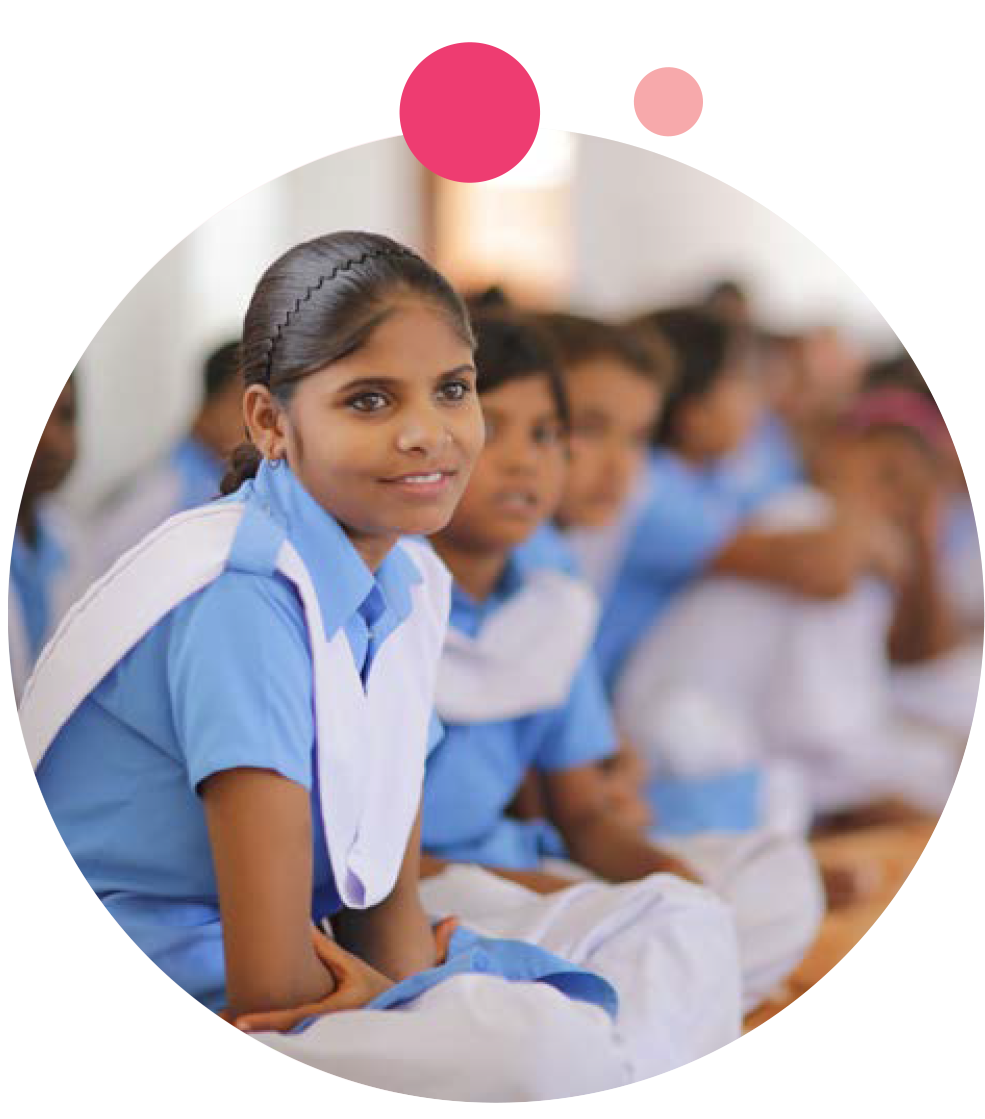
Farmers, community & governmental agencies
Environment, Farmers & Local community
Teachers and students (school)
Budding Entrepreneurs
Students, Schools, Facilities, Communities
Farmers, community, students, governmental agencies
Farmers, Environment
Communities, Healthcare facilities, frontline workers
Parachute Kalpavriksha Foundation (PKF) is a non-profit organisation that strives to create a lasting impact on the lives of farmers.
Objectives
Equip farmers to have increased sustainable crop yield leading to enhanced income opportunity
Train farmers on scientific and researchbased agricultural practices which results the productivity improvement
Support activities
Support centres
Kalpavriksha Knowledge Centre (KKC)
Companion of farmers for increasing production and knowledge
Agri-Business Centre (ABC)
Agri-clinic offering farm care inputs and technical services
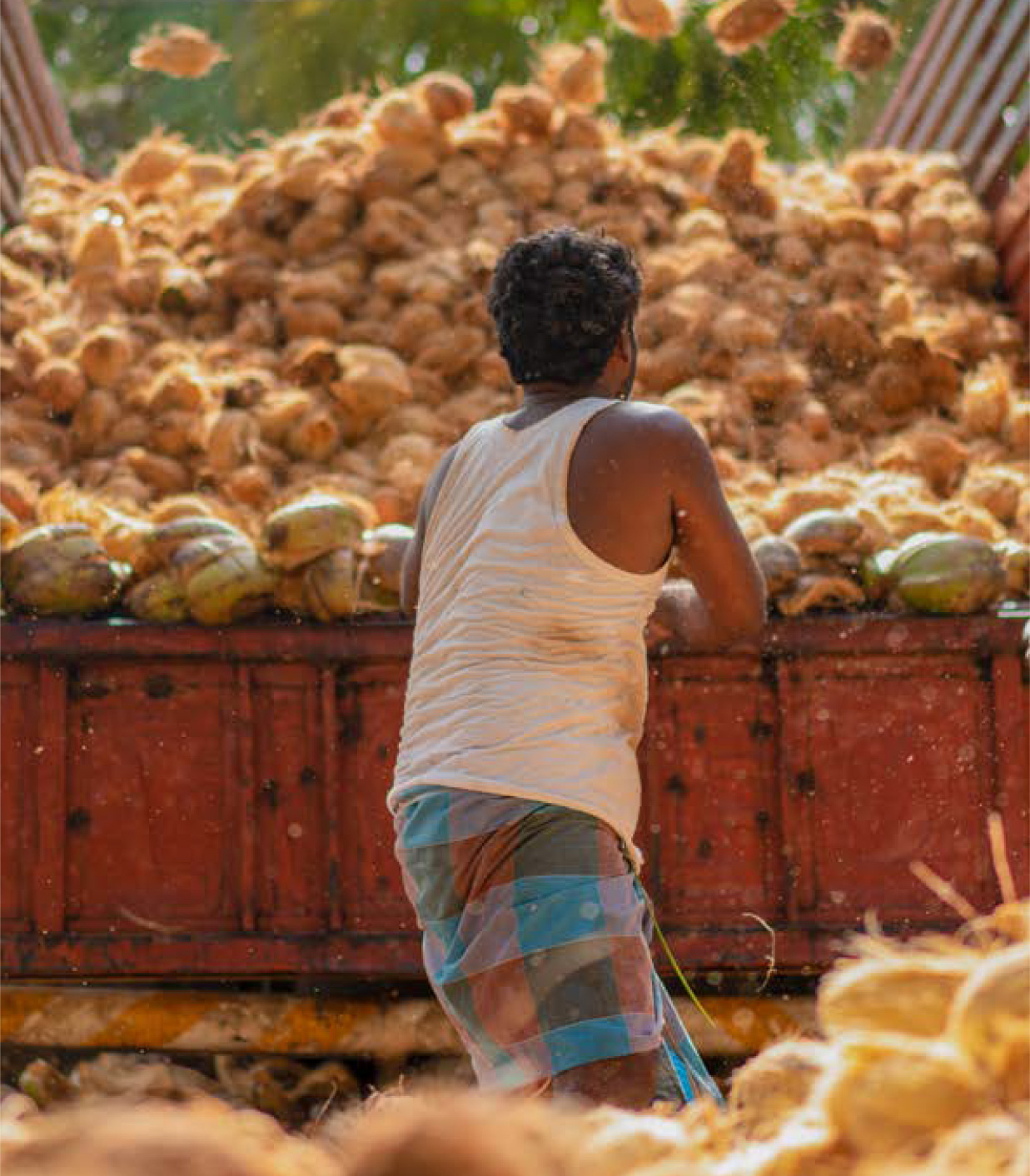
Acreage enrolled
farmers enrolled
Improvement of productivity
farmers were engaged through digital interventions rolled out by PKF in FY23.
downloads of mobile application.
users visited the PKF website in FY23.
Instagram followers
YouTube followers
Facebook followers
of acreage enrolled till FY23; 55,900 acres were enrolled in FY23.
increase in productivity for enrolled farmers
were enrolled cumulatively, with 18,000 farmers enrolled in FY23.
have been set up till date and 1600+ farmers benefitted from the services offered.

MQH Best Practices Award

FICCI Sustainable Agriculture Awards for Farmer Income Enhancement

International Coconut Community (ICC) Visit

Covered by Brut India

The “one within us all” Campaign
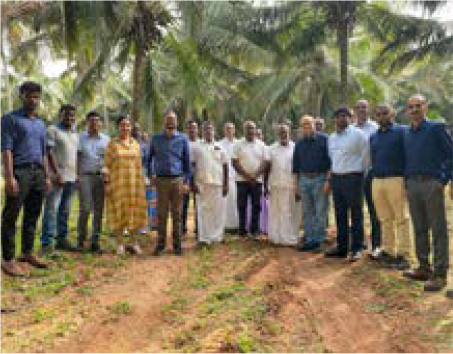
CSR Committee Visit
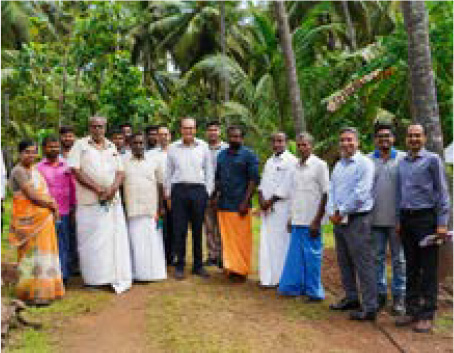
Chairman Visit
The Agri-Business Centre is operated by local entrepreneurs and allows coconut growers to obtain farm care inputs and technical services. It acts as a platform for farmers to hire high quality farm machinery, equipment, technical assistance as well as labour at cost effective prices. It is also offering local agripreneurs exposure and recognition, along with financial stability.

“My name is Annadurai, I am from Tensengupalayam. Duraisamy from Kalpavriksha team has been coming to my form every month for the past 3 years. I used to face issues like stem bleeding, pest attack, and root damage in my form. Kalpavriksha team helped me tackle these issues. They also helped provide root feeding treatment to trees. As there was low labour availability, Duraisamy brought the labours and helped complete the process. The quality and quantity of nuts have improved now. Post the intervention, the trees are looking healthy. Earlier I was harvesting 6 loods, now I am harvesting 9 to 10 loads.”
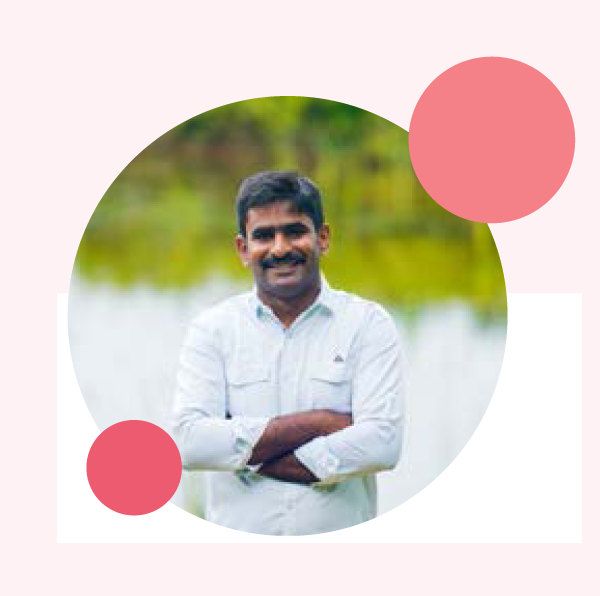
“I am Satheesh Kumar, and I am from Kuruvayakoundan palayam. I own 12 acres of farm in Coimbatore. Water availability has always been a problem in my form, & I wasn’t aware of the benefits of farm ponds initially. Once I came to know of its advantages, we contacted Parachute Kalpavriksha Foundation for constructing a farm pond.
Post construction, we now have good water storage facility. Our form pond is 8 feet deep and has 1000 cubic metre capacity. Earlier we used borewells at 700-800 ft levels. Now, water is stored in the ponds and when there is a drop in water level, it gets replenished. We have faced severe issues with water scarcity in the past. Post constructing the form pond, water storage is good. Button formation has improved, and shedding is not much seen.
Water is crucial for agriculture. Due to low availability of water, we have suffered a lot. Now this issue has been resolved for us by the Kalpavriksha team. I request them to bring more schemes like this in the future.”

Yahiryar Kani, 35 years old was working as a machine operator in Saudi Arabia. He bought a 12-acre farm in TN & makes a full-time income from his farm.
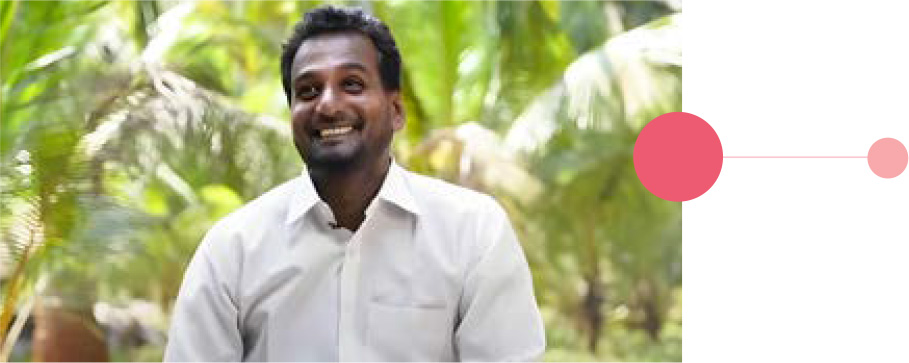
Ashok Kumar, 26 years old is a marketing professional who quit his job to take up farming full-time. He currently manages 400 trees.

Mugendran, 23 years old is MBBS Graduate managing an 8-acre farm while running an evening clinic in his village
Jalashay’, Marico’s water stewardship programme focuses on replenishing more water in comparison to the amount of water consumed in its own operations, year on year. It takes into account the environmental, social and economic concerns that might arise from water stressed regions and proactively undertakes efforts towards abating them.
Encourage efficient water management and conservation. By building capacity, replenish more water to the neighbourhood than Marico uses for its operations.
30 Crore litres of water conservation potential created this year Water storage created through farm pond creation, desiliting water bodies, construction of water storage facilities in various states, till date 292+ Crores litres
Watershed programme implemented at Jalgoan, Maharastra
Tamil Nadu coconut farmers were provided with farm ponds and trench cum bunds.

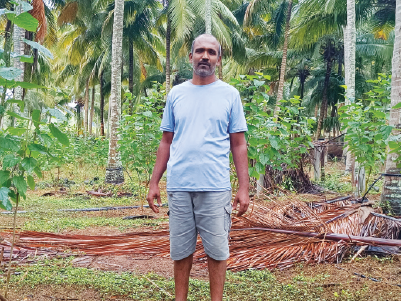
Ravi Kanakaraj, a small farmer from Devanampalayam, faced major water shortages in summer. Annually, he used to spend H 18,000 to buy water during the summer season. Through the Jalashay program, in 2018 he constructed a farm pond with storage capacity of 227m³. After construction of the farm pond, he has water during the summer season and does not need to buy water. Additionally, Ravi started intercropping coconut with mulberry. He is able to sufficiently provide water for both crops. He now receives a steady stream of income from mulberry at around H 3 lakh annually. He has plans to line his farm pond and undertake fish farming
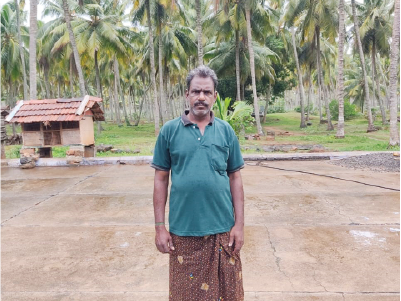
Nadarajan faced major water shortages in the past due to which he was never able to provide sufficient irrigation to his coconut trees. He testifies that after he received the farm pond, groundwater recharge has improved, and he now has sufficient water to provide irrigation as per recommended practices. He has also experienced an increase in productivity, from 150 coconuts per tree to 170 coconuts per tree, annually.
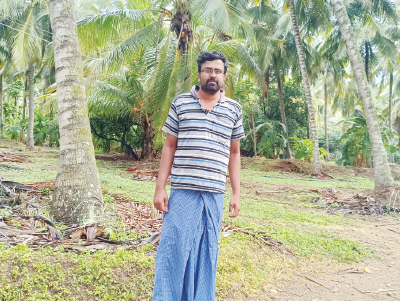
Prabhu, a farmer from Devanampalayam has adopted a unique model wherein he alternates the use of the farm pond that he received, for both recharge and for storage. During the rainy season, the structure is used to recharge groundwater. During the summer season, he uses a tarpaulin sheet which acts as a temporary lining to the structure which helps him store water, which he uses for irrigation.
Taking into account the depleting green cover and its impact on local environmental conditions and biodiversity, we engage in afforestation activities to combat global warming, reduce air pollution, arrest soil erosion and create an ambient atmosphere for local flora and fauna to thrive. As par t of our afforestation drive, in FY23, plantation of 73,250 trees were initiated, in t he districts of Rajasthan, Assam, Himachal Pradesh, Maharashtra, Gujarat and Meghalaya. Around 5,000 farmers benefitted from the planting of 50,000+ fruit bearing saplings. The plantation drives were conducted through two projects: fruit tree distribution and habitat protection.
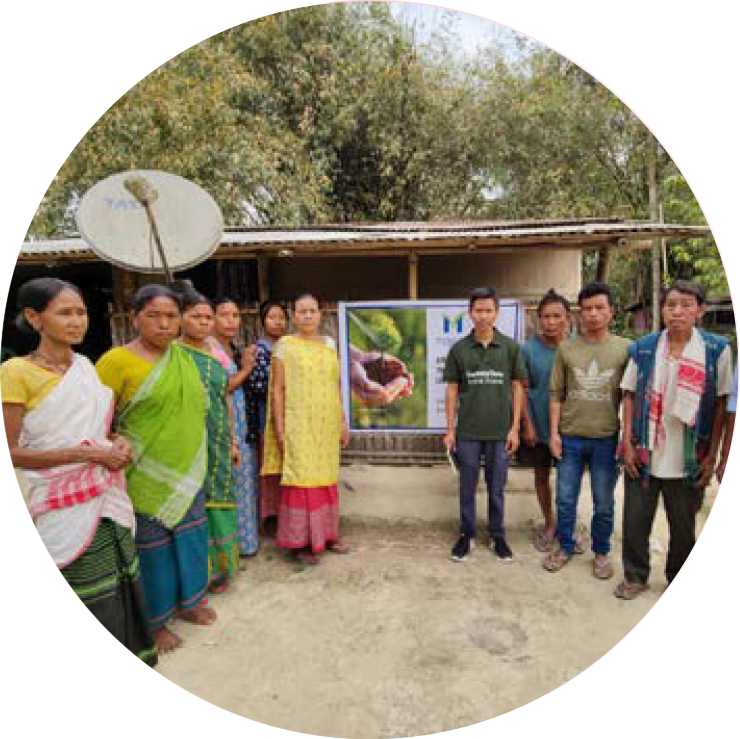
Under this project, 50,000+ fruit trees were procured and planted in the districts of Rajasthan, Assam, Himachal Pradesh, Maharashtra, Gujarat and Meghalaya. It benefitted the farmers living in remote areas and technical guidance was also provided to facilitate healthy growth of these trees.
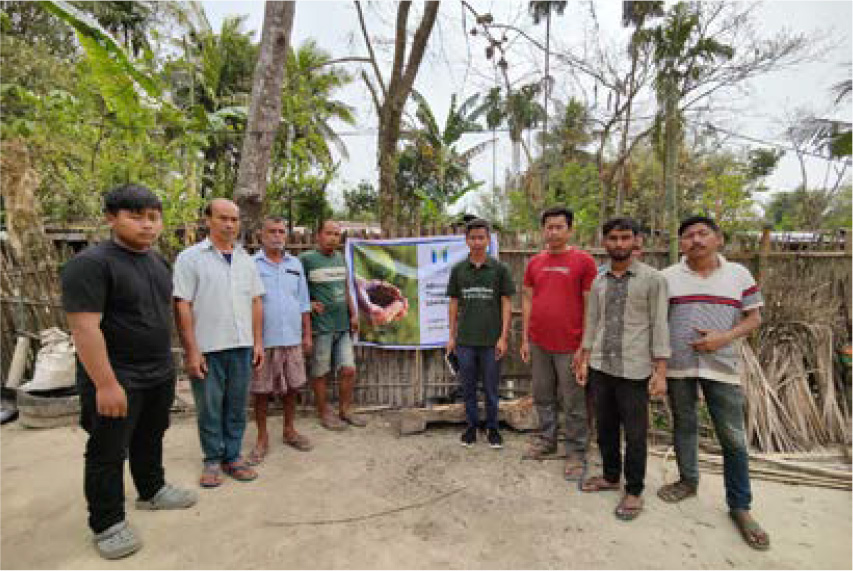
For the past six years, Marico is collaborating with FSSAI for the Eat Right India movement. It promotes healthy eating habits and is aligned with the government’s public health programmes such as ‘Ayushman Bharat’, ‘Swachh Bharat Mission’, and ‘POSHAN Abhiyaan’.
In FY23, we collaborated with FDA, other partners and conducted the following activities:
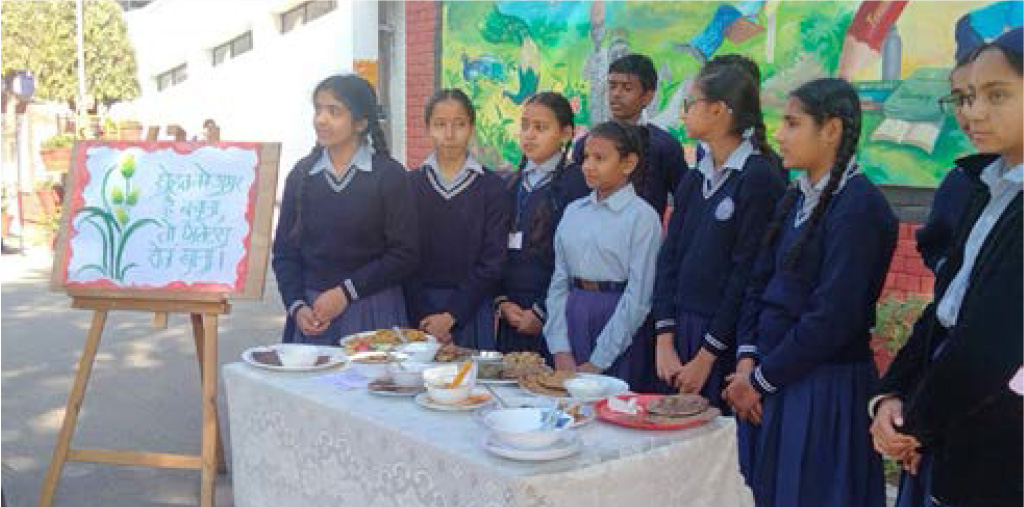
Eat Right programmes in schools
Eat Right programmes in Campus
Clean Street Food Hubs
Eat Right programmes at Place of Worship
sessions for capability development
programmes carried out in 10 institutions
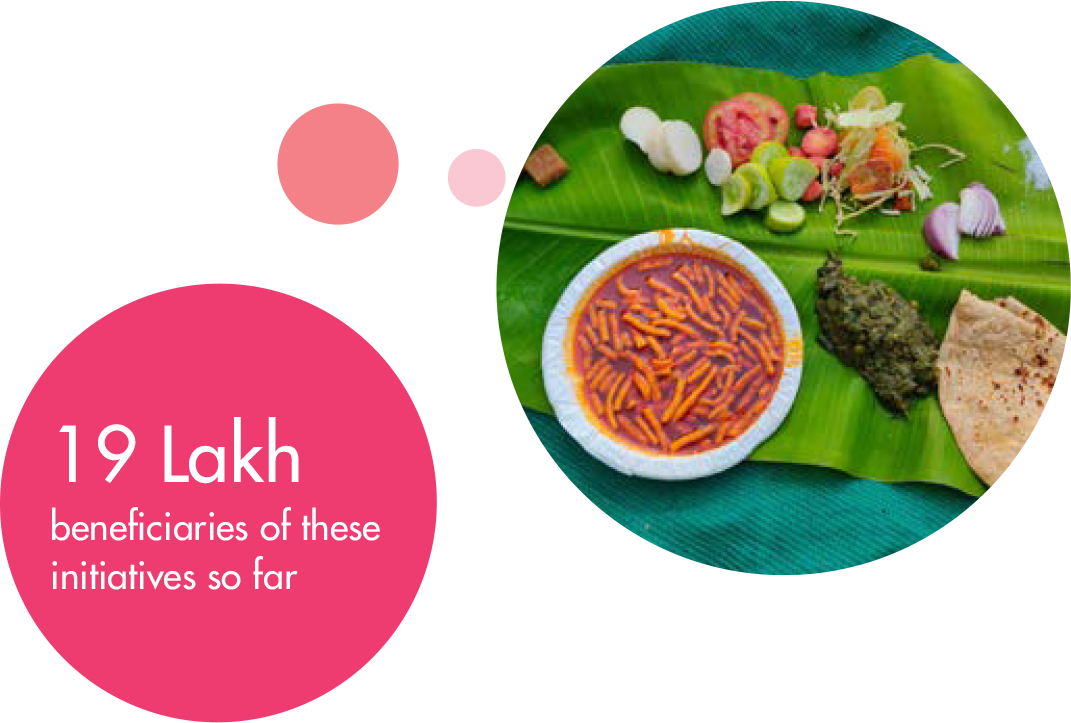
Community sustenance initiatives provide us an opportunity to give back to the society by addressing the needs of the local population. Th e programme is carried out around our manufacturing facilities and consists of different projects covering the realms of education, environment, health, infrastructure, disaster relief and others.
After certain years of service, police personnel start facing health issues ensued from improper diet, lack of sleep, rotational shifts no routine body checkups and mental stress owing to the nature of their job.
Marico planned to organize medical camps for police personal across plant locations offering full body check up to each beneficiary along with doctor consultation free of cost.
Health camps organized for police personnel across Pondicherry, Perundurai, Guwahati, Jalgaon offered more than 70 types of medical tests to each beneficiary that included tests related to lipid profile, liver function, hemogram, thyroid profile, iron, kidney function, urine routine, eye and ear, to mention a few. This program was implemented and monitored by our NGO partner ‘Go Dharmic Foundation’ in coordination with government officials.
247 Marico members volunteered
278 Volunteering hours contributed towards the cause
As part of the programme, volunteers from Marico cleared 1,250 kg of garbage in Mumbai, Pondicherry and Sanand and recorded 50 Audiobooks in English for 250 visually impaired students
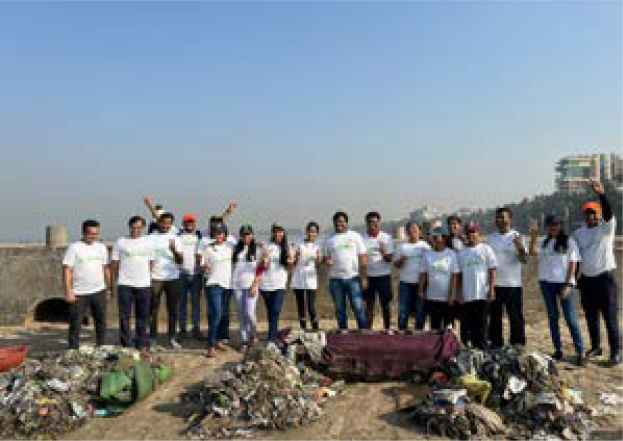
Events organised
Volunteers
Volunteering Hours
Volunteer experience rating
SDGs covered

Location – Guwahati
Number of Schools - 60
No. of years of collaboration – 2 years (2022-23 to 2023-24)
No. of beneficiaries – 7703 students + 311 teachers
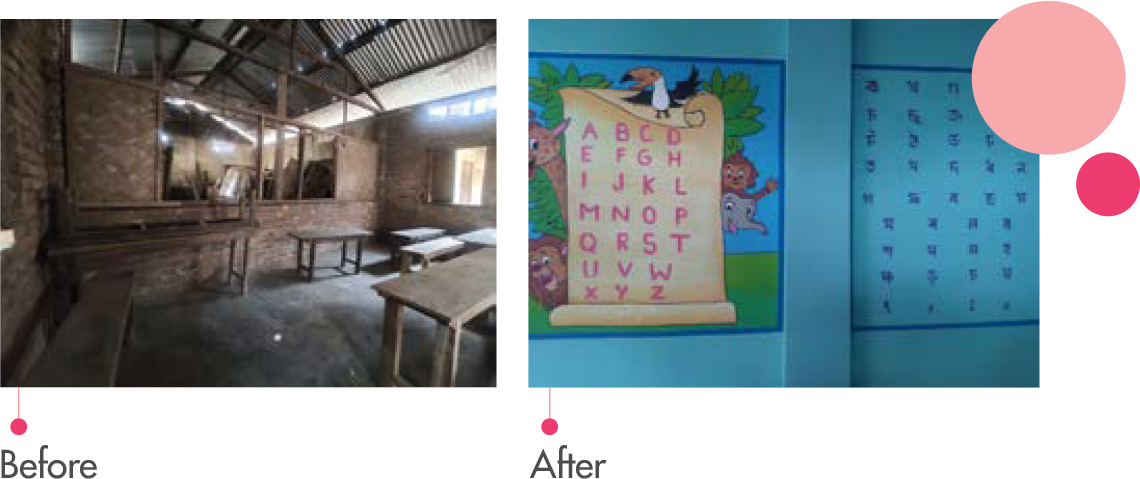
Location – Guwahati
School’s name - Kurua LP School, Gouripur LP School & Mrinalini Devi Shishu Niketan
No. of years of collaboration – 5+ years
No. of beneficiaries – 600+ students and teachers
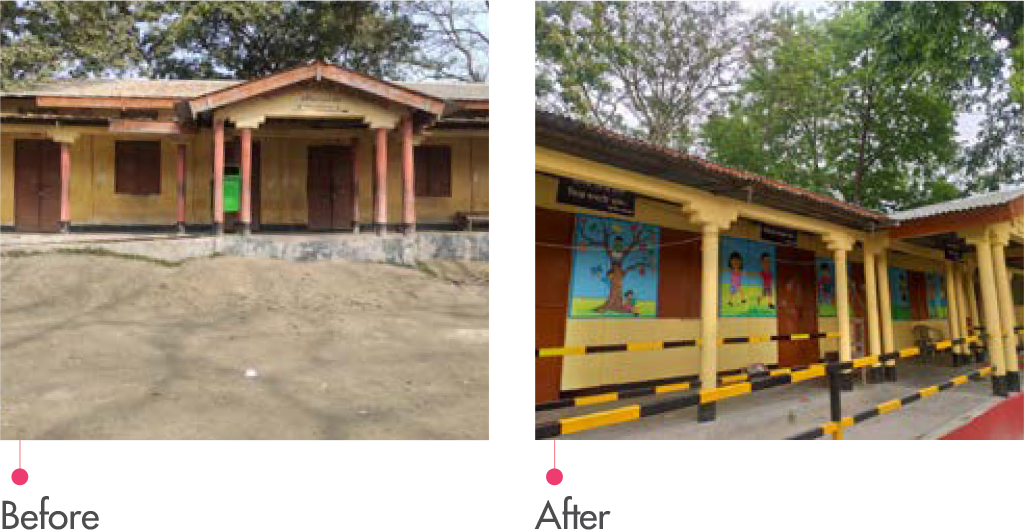
Type of support: Educational programmes for students, infrastructural support, teachers’ training etc.
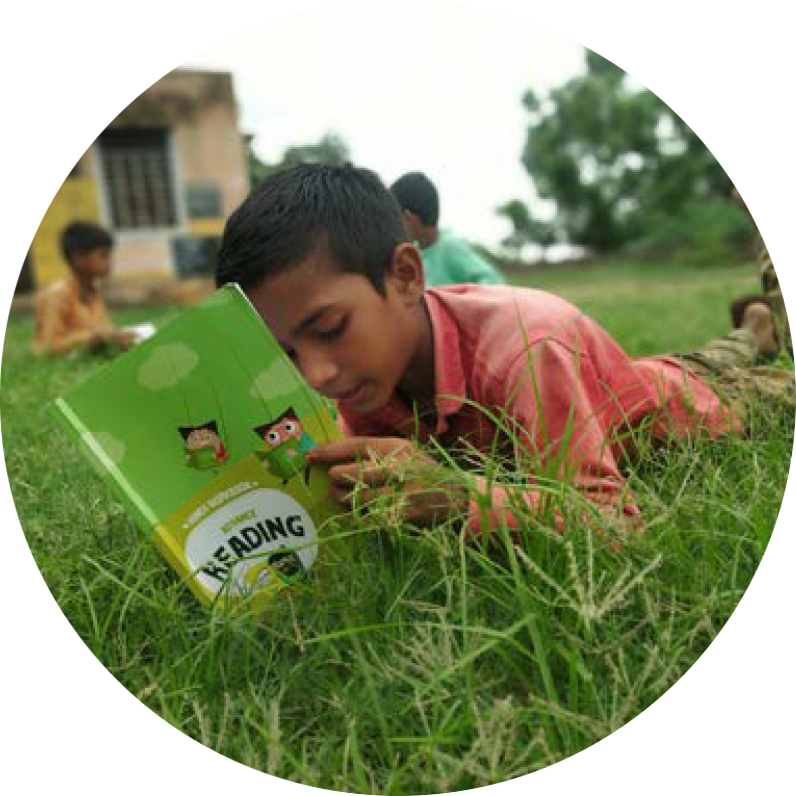
Nihar Naturals x Nihar CSR programmes: Living the Brand’s Purpose
Nihar Naturals Shanti Amla, one of Marico’s signature brands, focuses on providing opportunities for accelerating the access to education through holistic initiatives.
The Nihar Shanti Pathshala Funwala (NSPF) programme aims to address a growing concern about fluency in English literacy in government school teachers. The programme intends to upskill teachers and improve English reading and speaking proficiency of students from underserved areas. Through a comprehensive learning and development approach it has empowered teachers with subject-matter knowledge and enabled them to engage better with the students. Besides, access to digital learning platforms have improved the learning environment for students.
Fluency in English has been a pressing issue for government school teachers and NSPF, in collaboration with various state governments, helped to provide government teachers access to comprehensive teaching material to improve the standard of education in marginalised areas. We also designed scalable and funbased learning models, supported by online as well as offline tools to make education engaging and usher in a transformation in the overall literacy quotient of our country.
To enhance the outcome of the programme and create measurable impact on students as well as teachers, we deployed WhatsApp Enterprise model-based learning programmes. The technologically fortified solutions helped to upgrade the capability of teachers to impart proper training for enhancing fluency in English language. The innovative formats were designed to be engaging, practical, and rural-ready in nature to align with the specific needs of students and teachers.
In the reporting year FY23, WhatsApp (online) as well as workbook (offline) led programmes were imparted in 50 Aspirational Districts of Madhya Pradesh, Rajasthan, Jharkhand, Bihar and Chhattisgarh. The outcome of the project in the current year takes us a step forward to achieve our target for FY25.
teachers to be trained
teachers trained through WhatsApp & Workbook-led project
students to benefit from the programme.
students benefitted through the programme
Presence is in 50 Aspirational Districts of Madhya Pradesh, Jharkhand, Rajasthan, Bihar and Chhattisgarh.
Presence in 16 CM Rise Schools in two blocks of the District of Sehore, Madhya Pradesh
State has integrated the WPC championship into its academic calendar as a state-wide event in Madhya Pradesh and Jharkhand.
Received in-principle state approval for targeting Kasturba Gandhi Balika Vidyalaya, focusing only on girls in Madhya Pradesh and Jharkhand for FY24.
Marico Innovation Foundation (MIF) was started in 2003 with an aim to nurture and propel innovations in India.
Over the past 20 years, MIF has evolved into being India’s coveted innovation focused platform, which recognizes disruptive Indian innovations & supports the innovative organizations journey to scale impact.
Through its flagship programs, MIF has unlocked the potential of 100+ disruptive innovations
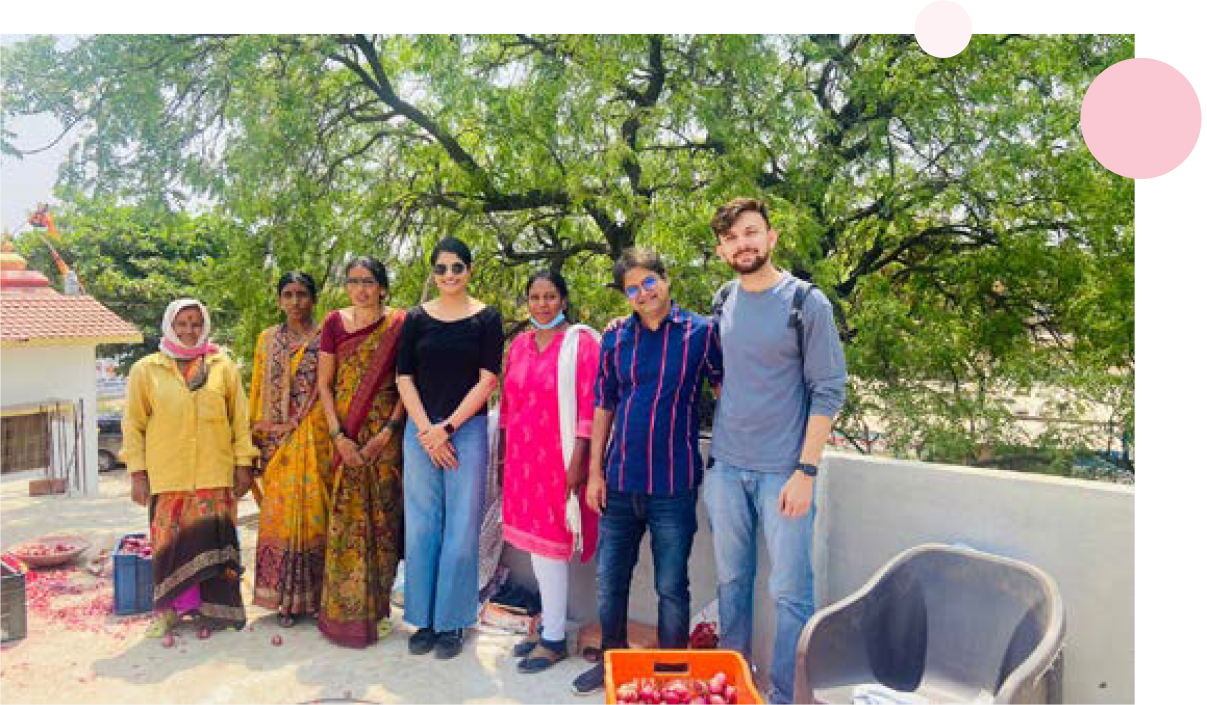
Started in 2016, Scale-Up is a beyond capital, no equity, rapid acceleration program that catalyses innovations through personalized, deep-rooted strategic and functional mentorship and other network support offerings.
The objective of the program is to mentor and scale disruptive innovations from early-stage annual revenues (approx. 1 CR annually) to H 100 CR of annual revenues in 3 - 5 years.
Fosters innovative solutions for plastics waste management and Agri-tech to rapidly scale and create social and environmental impact and become financially sustainable businesses.
Growth of the Agri cohort resulted in societal impact ranging from creating livelihoods for women microentrepreneurs, reduction in energy usage and food security.
Plastics cohort is fueling the journey towards a sustainable future by addressing the challenge of plastic waste management across the value chain. Solutions such as alternatives to single-use plastics, innovative recycling technologies and sustainable packaging are being developed and deployed.
Launched a holistic report in the plastic waste management sector- Innovation in Plastics: The Potential & Possibilities
In 2022, MIF ventured into the plastic waste management sector along with two Knowledge Partners - The Indian Institute of Science (IISC) and Praxis Global Alliance (a management consulting and knowledge services firm)
MIF launched a one-of-its-kind holistic report – Innovations in Plastic: The Potential and Possibilities that offers actionable solutions to tough problems across the value chain. It dives de ep and provides insights about the drivers, barriers, and value creation in the plastics sector to stimulate growth and deliver environmental benefits to the country.
The objective of this report is to trigger action. The insights are aimed to help catalyse government, corporates, citizens, and entrepreneurs to take actions aimed at solving the plastics waste problem at scale.
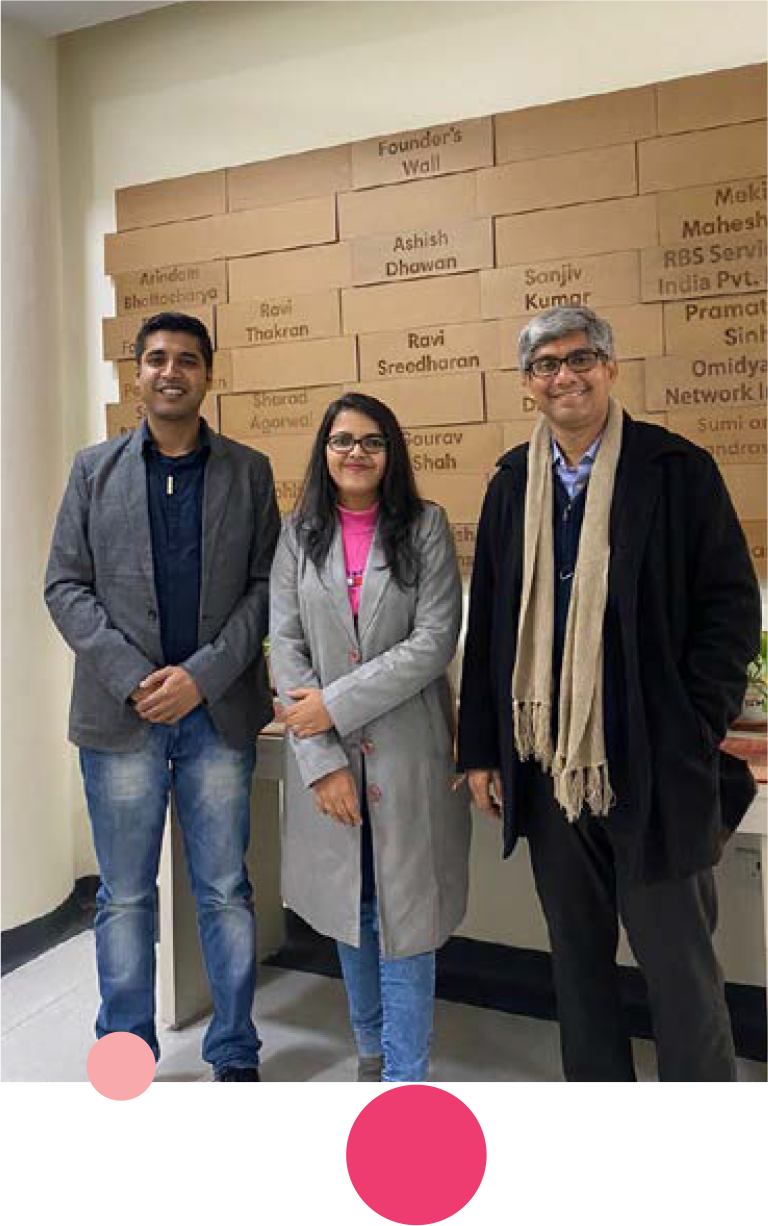

Dry waste segregation with next-gen automated AI based sorting machines

Non-toxic, hygienic method of recycling used sanitary napkins

Harnessing bamboo-based granules as a replacement for plastic

Used mycelium (fungi) as a medium to transform stubble waste into effective breakage-free packaging. It also helped to curb stubble burning and plastic pollution

Using cutting-edge technology to create construction material from low-value multi-layered packaging (MLP) waste which acts as a perfect substitute for wood-based plywood material, thus keeping a check on deforestation.
Launched in 2006, the biennial Innovation for India Awards is the first Indian platform to recognise and celebrate the pioneering work of `currently-hidden potentially game changing’ Indian innovations across two categories - business and social.
Over the past 9 editions of the Innovation for India Awards, 60+ disruptive Indian innovations have been recognized, some of which have been identified way bef ore their time
The Governing Council of MIF unanimously selected CoWIN as the ‘Global Game Changer’ for this edition.
In FY23, we appointed RTI International, an external agency, to conduct impact evaluation for our flagship programmes- Parachute Kalpavriksha Foundation, Jalashay, Nihar Shanti Pathshala Funwala and Nihar Skills Academy. Key outcomes of the exercise are highlighted below:
The Program’s objective of achieving higher and sustainable crop yield was reported to be achieved by 8 in every 10 farmers interviewed.
The program is working towards reducing farmers’ dependency on program support in order to onboard new farmers;
The program aims to help coconut farmers in Tamil Nadu (a water stressed state) become water secure.
The program contributes to SDG-1 (no poverty), SDG-6 (clean water and sanitation), & SDG 12 (responsible consumption & production)
The program is aligned with govt. priorities: Har khet ko pani & Jal Jeevan Mission
In FY22, 246 farm ponds were constructed leading to creation of an estimated 48 Crore litre of water storage capacity.
Farmers interviewed reported benefits such as increased groundwater recharge and availability of water during summer months.
While the program has helped farmers overcome water shortage during summer months, in the absence of watershed level inter ventions, long-term water security cannot be guaranteed.
The state education system recognizes the need for a special fo cus on English language in the regional language govt. schools, due to the competency g ap amongst teachers and learning gap amongst children. To address this need, the program has introduced an innovative phonetics-based teaching-learning pedagogy, to improve teacher’s confidence and children’s interest towards English language.
Livelihood losses as a result of the pandemic made the program relevant, especially for women, who were disproportionately impacted.
Outsourcing the training to local agencies, as a means of circu mventing mobility restrictions during the pandemic, together with restricted field monitoring visits by the project implementing agency impacted the overall effectiveness of the program.
Though placement results were not encouraging, 85% of the par ticipants evaluated stated that their confidence was increased after attending the program. Moreover, computer literacy and communication has helped few participants secure jobs in other sectors.
Though the skilling program showed promise, it was unable to pr ovide livelihood opportunities for the participants.